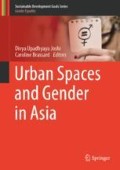Abstract
Climate change is increasingly recognised as one of the most challenging issues which is being experienced by humanity today. Though many researches and studies have acknowledged that women and the marginalised are the first and worst sufferers, solutions suggested to address the issues are ironically primarily technical and economically oriented. Human and gender dimensions are touched upon only by a few. At the same time, majority of the studies have based their research on climate change in rural areas, though in low and middle income countries like India, tremendous population growth is being experienced in secondary and small cities, aggravating the impacts of climatic variability and extreme events. This certainly conveys an urgency for studies covering all the three categories simultaneously: gender, climate change and urban areas, in developing countries. Thankfully, the importance of addressing these emerging issues in the urban context has increasingly been recognised now. The impact of gender-sensitive approaches on climate compatible development and pursuing gender mainstreaming in urban planning does result in improved climate compatible development outcomes and improved gender relations. And these are possible only through participatory, transdisciplinary and gender-sensitive approaches, as has been shown by a few studies conducted linking these three issues. In fact, climate change is providing an opportunity to be looking at these issues in a more holistic and transdisciplinary manner, which it deserves.
Access this chapter
Tax calculation will be finalised at checkout
Purchases are for personal use only
References
Antwi-Agyei P, Dougill AJ, Stringer LC (2017) Assessing coherence between sector policies and climate compatible development: opportunities for triple wins. Sustainability 9(11):21–30
Barth B (2010) Gender mainstreaming in the climate change response of Sorsogon City. In: Dankelman I (ed) Gender and climate change: an introduction. Earthscan, Netherlands, pp 100–104
Brydon L, Chant S (1989) Women in the Third World, gender issues in rural and urban areas. Edward Elgar Publishing Ltd, Hants, England
Bock S, Fedtke G, Gabizon S (2010) Climate justice through energy and gender justice: strengthening gender equality in accessing sustainable energy in the EECCA region. In: Dankelman I (ed) Gender and climate change: an introduction. Earthscan, Netherlands
Chant S (2007a) Gender, cities and the millennium development goals in the global south, LSE gender institute. New Series Working Paper, Issue 21, London. (http://www.lse.ac.uk/gender/assets/documents/research/working-papers/Gender-Cities-And-The-Millennium-Development-Goals-In-The-Global-South.pdf)
Chant S (ed) (2007b) Gender, generation and poverty: exploring the ‘Feminisation of Poverty’ in Africa. Asia and Latin America, Elgar
Chant S (ed) (2010) The international handbook of gender and poverty: concepts, research, policy. Elgar
Chant S, McIIwaine C (2016) Cities, slums and gender in the global south. Routledge, London
Dankelman I (2010) Epilogue: from divergence towards convergence. In: Dankelman I (ed) Gender and climate change: an introduction. Earthscan, Netherlands
Film on ‘missing women’. https://youtu.be/CgnW_Km7YQA:CDKN
Johnsson-Latham G (2010) Why more attention to gender and class can help combat climate change and poverty. In: Dankelman I (ed) Gender and climate change: an introduction. Earthscan, Netherlands, pp 212–222
Khosla P, Masaud A (2010) Cities, climate change and gender: a brief overview. In: Dankelman I (ed) Gender and climate change: an introduction. Earthscan, Netherlands, pp 78–96
Mani N, Wajih SA (2014) A participatory approach to micro-resilience planning by community institutions: the case of Mahewa Ward in Gorakhpur City. Gorakhpur Environmental Action Group, India
Mitchell T, Maxwell S (2010) Defining climate compatible development. Climate Development Knowledge Network (CDKN) Policy Brief, London
Negi B, Sogani R, Pandey VK (2010) Climate change and women’s voices in India. In: Dankelman I (ed) Gender and climate change: an introduction. Earthscan, Netherlands, pp 72–77
Nunan F (2017) Prospects and challenges for climate compatible development. In: Nunan F (ed) Making climate compatible development. Routledge, London, pp 242–254
OECD DAC Network on Gender Equality (gender net) (2015) Making climate finance work for women: overview of the integration of gender equality in aid to climate change. http://www.oecd.org/dac/gender-development/Making-Climate-Finance-Work-for-Women.pdf
Planning Commission of India (2012) Urbanisation in India—Twelfth Five Year Plan. http://www.slideshare.net/PlanComIndia/urbanisation-in-india-12th-plan-2012-2017
Salve, wire (2015)
Schalatek L, Burns K (2013) Operationalizing a gender-sensitive approach in the Green Climate Fund. Heinrich Boll Foundation. http://unfccc.int/files/cooperation_and_support/financial_mechanism/standing_committee/application/pdf/final_schalatek_burns_gcf_gender-sensitive-approach.doc.pdf
Schipper L, Langston L (2014) Gender equality and climate compatible development- Drivers and challenges to people’s empowerment. Overseas Development Institute, London
Singh BP (2012) Sociology of female Foeticide and infanticide. Where does the law stand? Gender Forum 38: 201
Skinner E (2011) Gender and climate change. Overview Report. Institute of Development Studies, Brighton, UK
Social Action Forum for Manav Adhikar (No date) Discrimination of the girl child in Uttar Pradesh. Social Action Forum for Manav Adhikar, New Delhi
Sogani R (2016) Gender approaches in climate compatible development: Lessons from India. Climate Development Knowledge Network (CDKN) and Practical Action Consulting, London. https://cdkn.org/wp-content/uploads/2016/05/CDKN_India-Gender_report_WEB.pdf
Sultana F (2010) Living in hazardous waterscapes: gendered vulnerabilities and experiences of floods and disasters. Environ Hazards 9(1):43–53
Swedish National Road Administration (2005) Res jamt: tankar bring ett jamstallt transport system, 110
UNFCCC (2015) Paris agreement. United Nations Framework Convention on Climate Change, Bonn
UN-HABITAT (2009a) Climate change vulnerability and adaptation assessment report. UN-HABITAT, Nairobi
UN-HABITAT (2009b) Global report on human settlements 2009: planning sustainable cities. UN-HABITAT, Nairobi
United Nations Population Fund (UNFPA) (2007) State of World Population—Unleashing the Potential of Urban Growth. UNFPA, New York
www.rightlivelihood.org/narmada.html. Accessed 14 Jan 2010
Author information
Authors and Affiliations
Corresponding author
Editor information
Editors and Affiliations
Rights and permissions
Copyright information
© 2020 Springer Nature Switzerland AG
About this chapter
Cite this chapter
Sogani, R., Viswanathan, K.R. (2020). Gender-Sensitive Approaches and Issues of Urban Climate Changes: Benefits and Challenges. In: Joshi, D., Brassard, C. (eds) Urban Spaces and Gender in Asia. Sustainable Development Goals Series. Springer, Cham. https://doi.org/10.1007/978-3-030-36494-6_11
Download citation
DOI: https://doi.org/10.1007/978-3-030-36494-6_11
Published:
Publisher Name: Springer, Cham
Print ISBN: 978-3-030-36493-9
Online ISBN: 978-3-030-36494-6
eBook Packages: Social SciencesSocial Sciences (R0)

